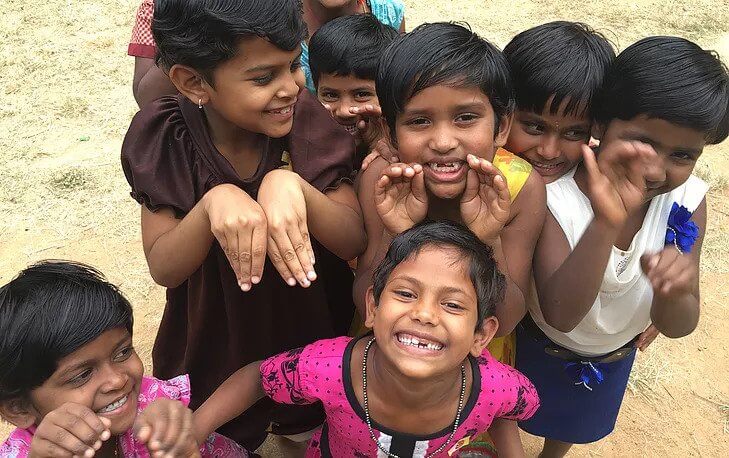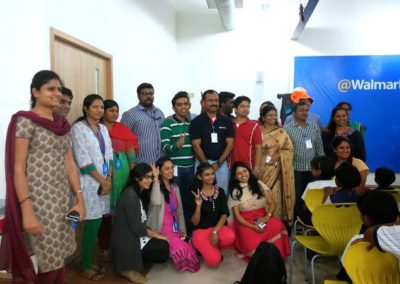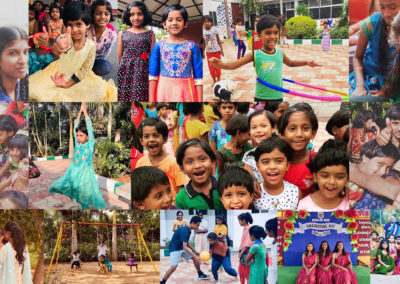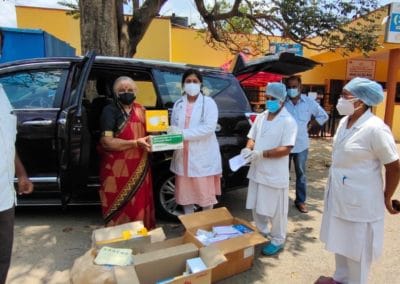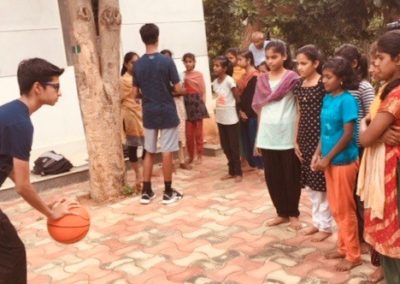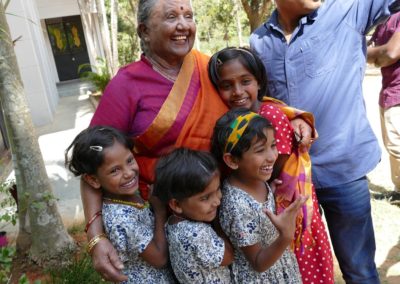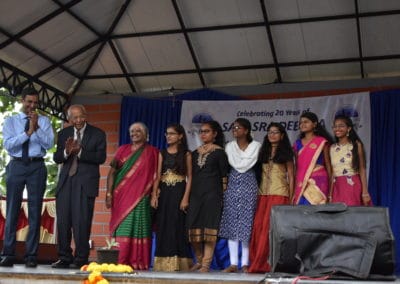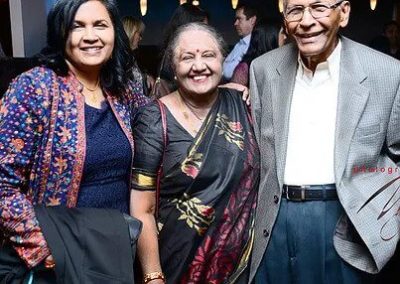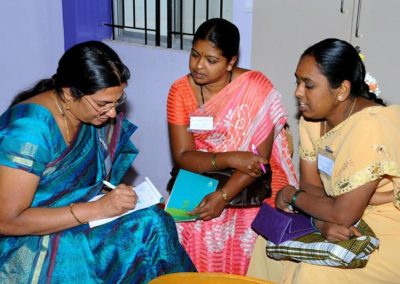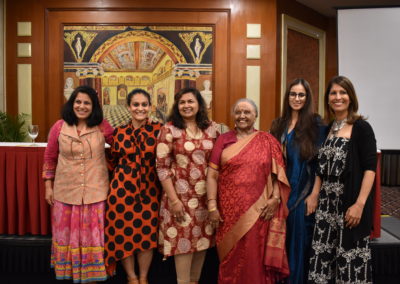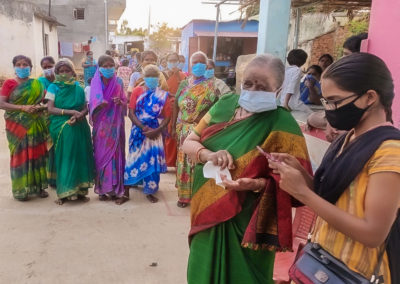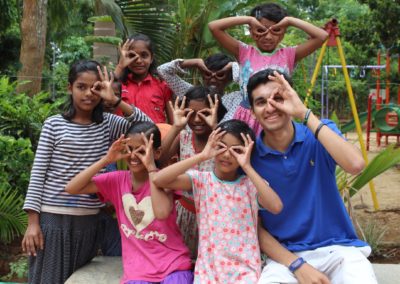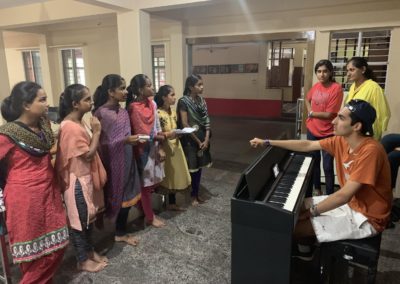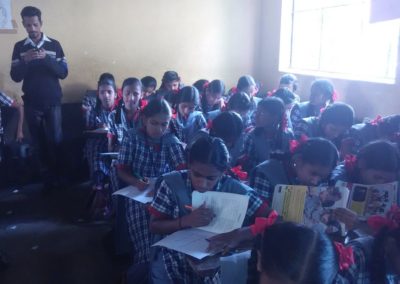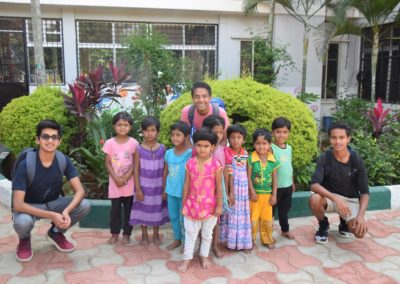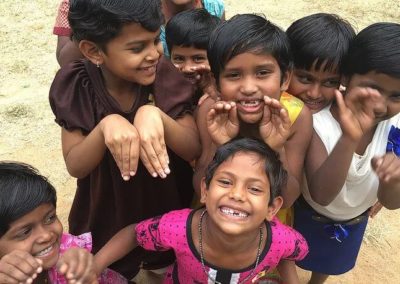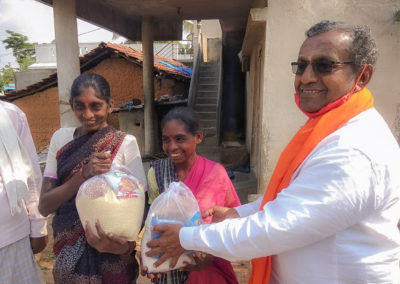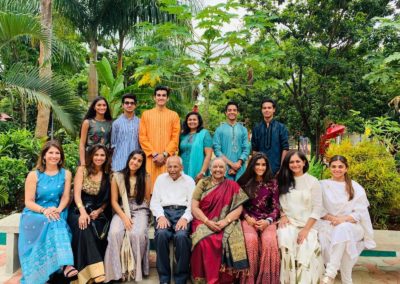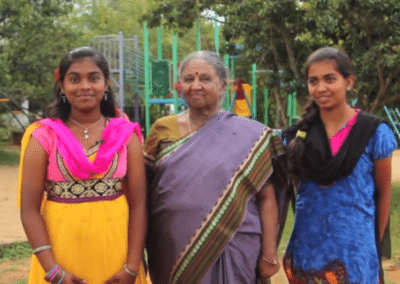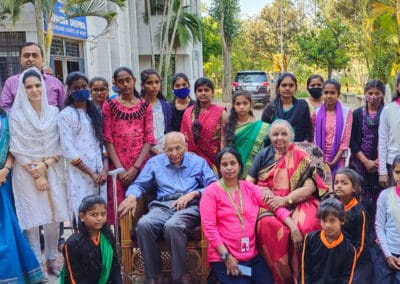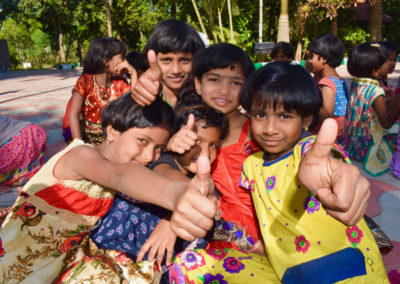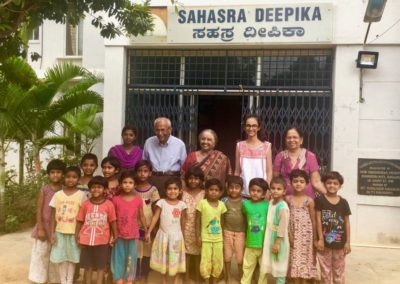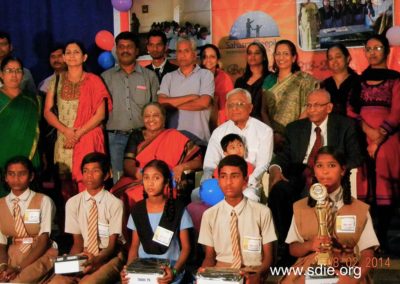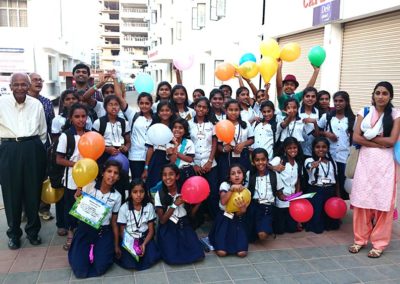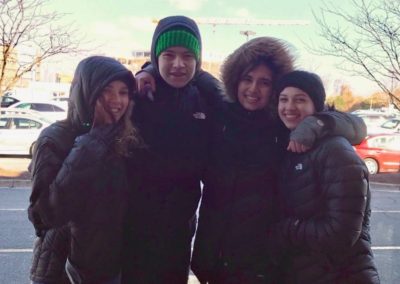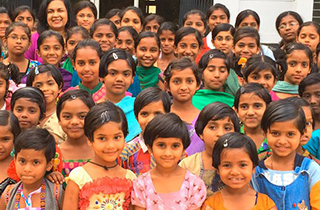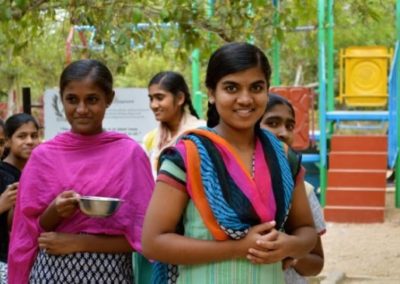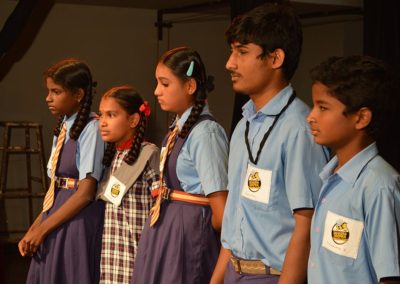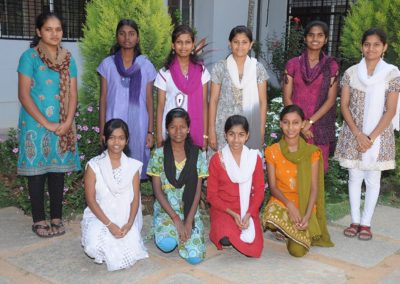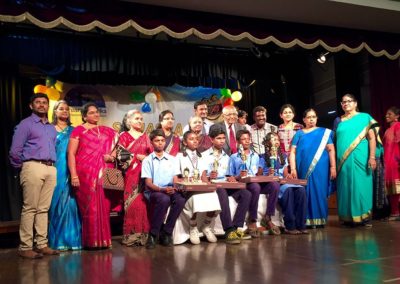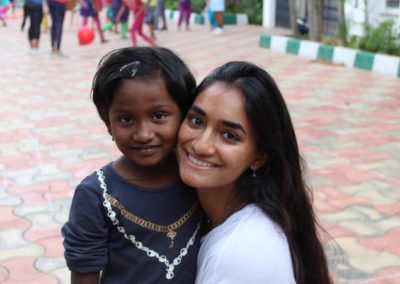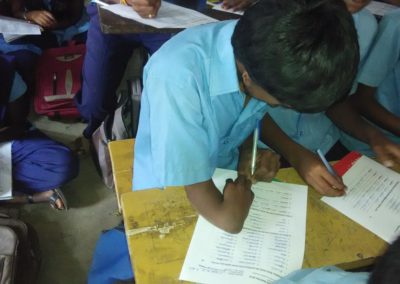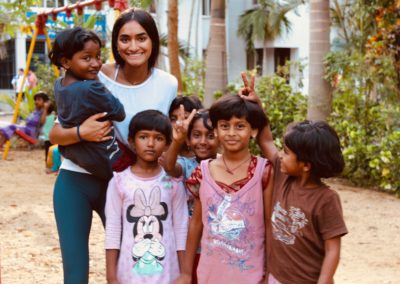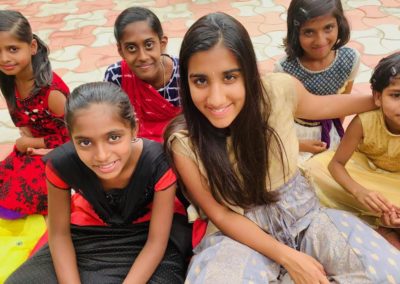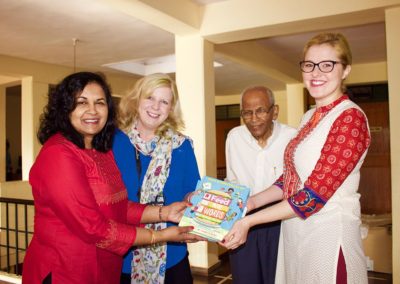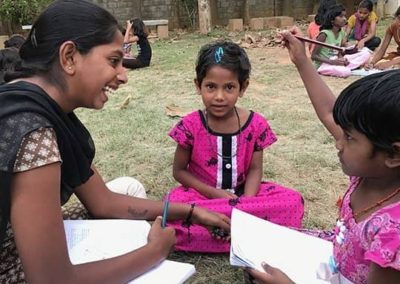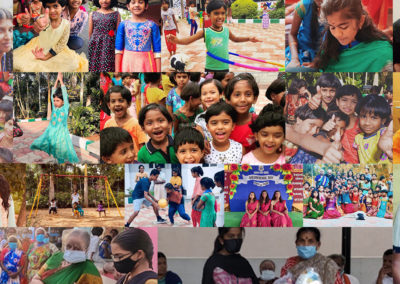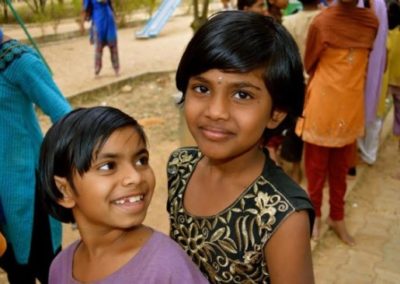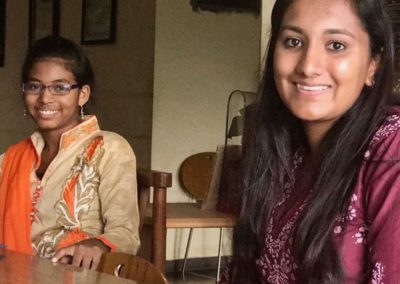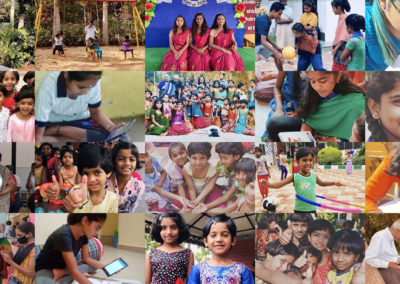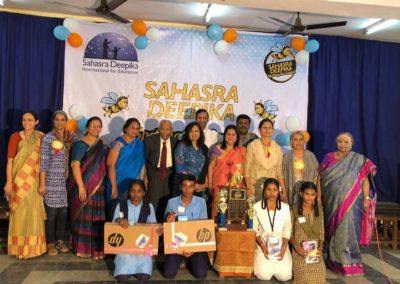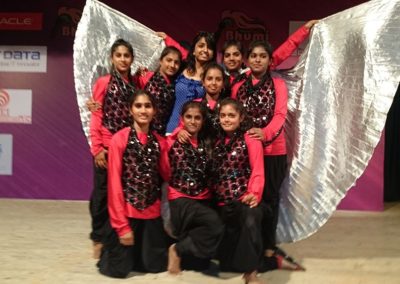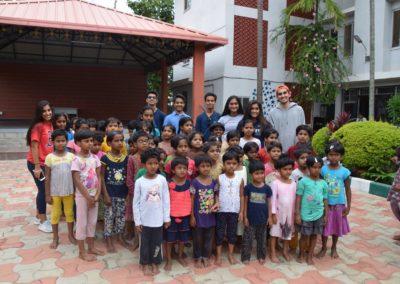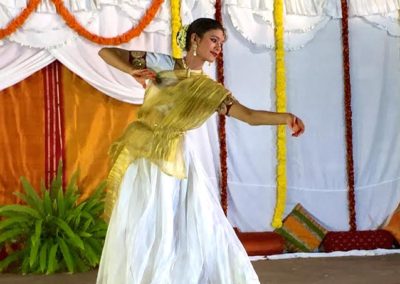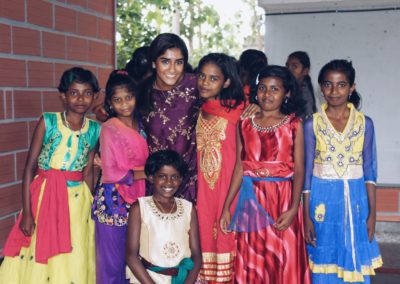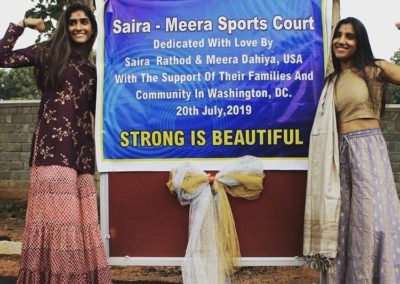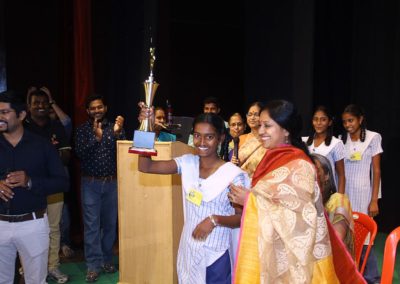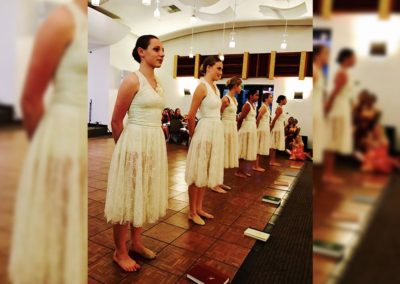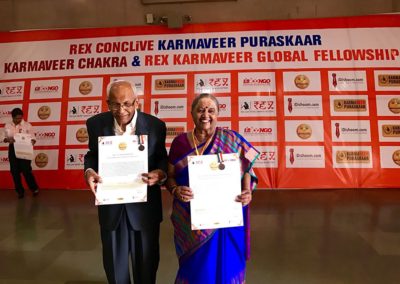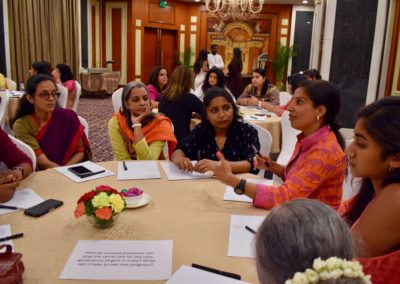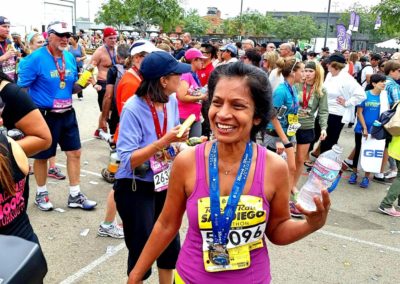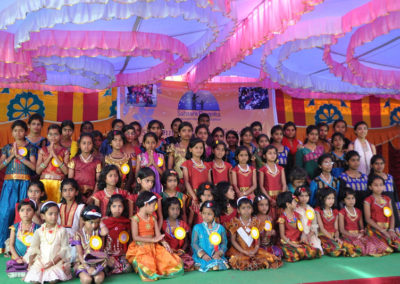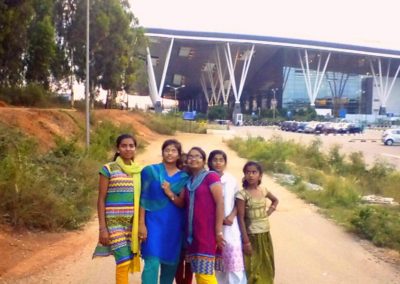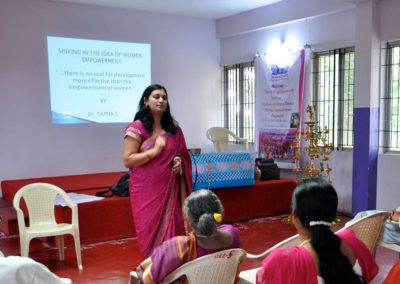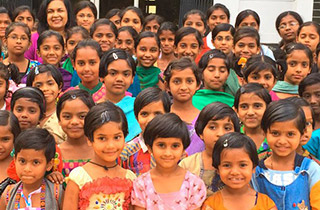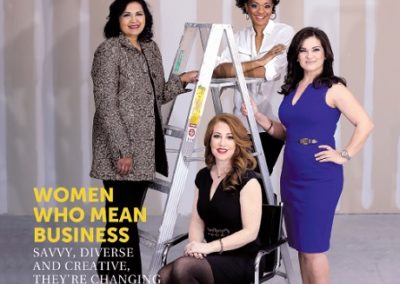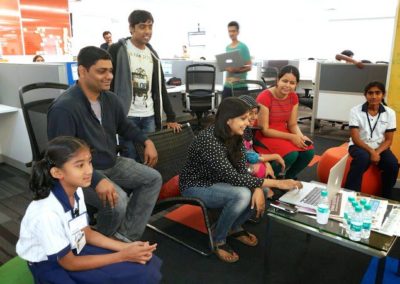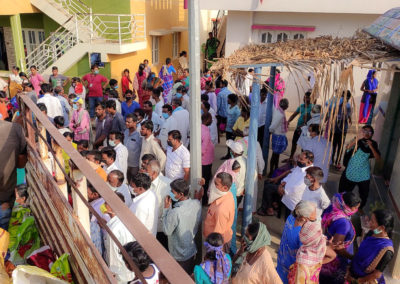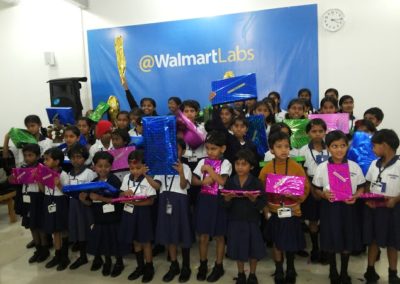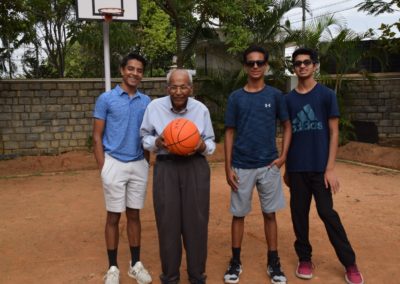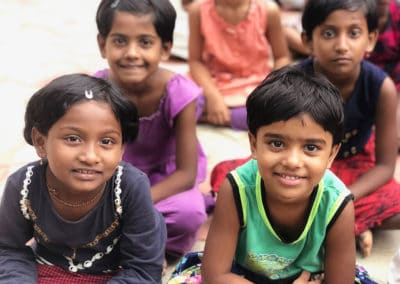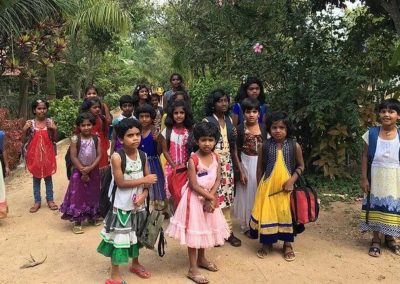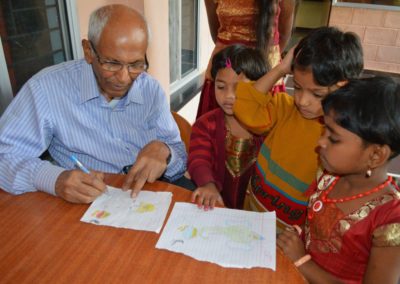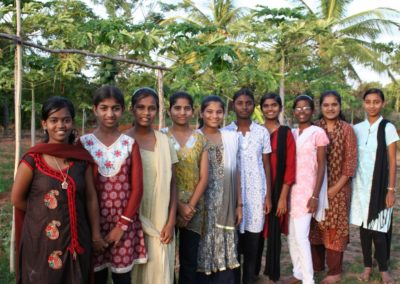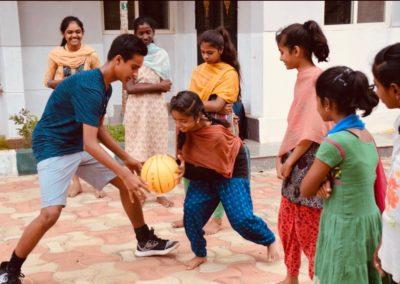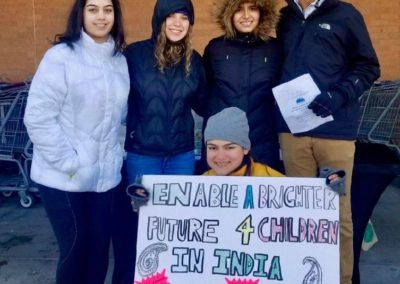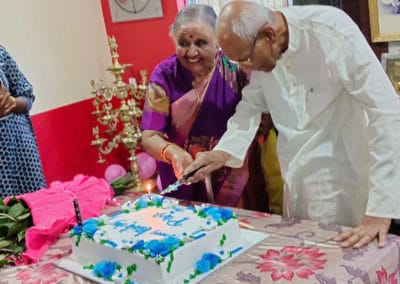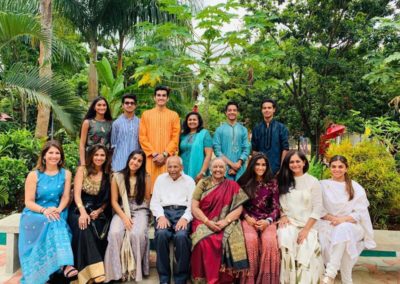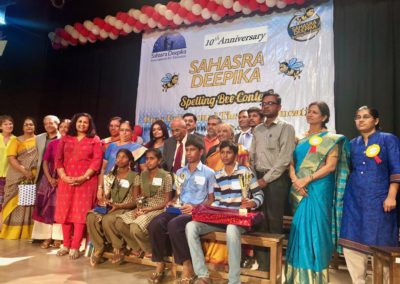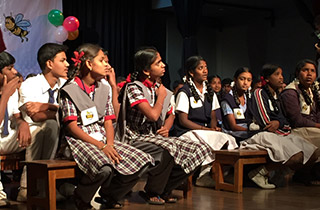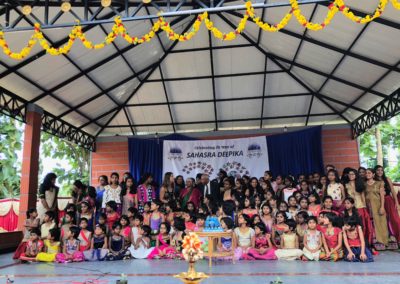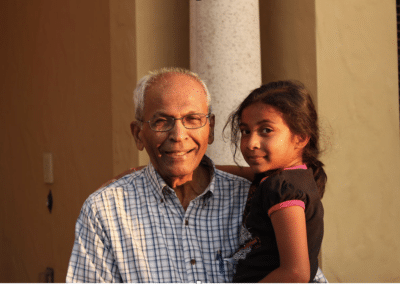Sarva Rajendra & Vijaya Ramakrishna in conversation with Monika Samtani at Sahasra Deepika in Bangalore, India | July 2018
What an incredible story you both have. You’re trailblazers in your own right, especially Mrs. Ramakrishna, because so many years ago you took a bold step when you had a successful life in America and you said, I’m going to go back with my husband and I’m going to start something that willto change the lives of many, many girls. Tell us about that dream and that hope that you had when you came back.
VIJAYA: I’ve been thinking about this for a long time. How it came about is…all the time my husband would say, “I wouldn’t have come to America if I did not have education. Education was the key.” So I was looking for a few children to educate. We went through many, many different thoughts of doing something for women, for children, for everything. So finally we came back to his idea of having education for children. So, we discussed this every evening at our dining table – thinking about what can we do? When can we go? Many people said it was an impossible thought and that we would never achieve it because it’s not easy to start something in India, but we had a belief in us. No matter whether we recognized or not, we would like to have something start and keep going.
There are many difficulties in the beginning. But the joy is having this many children and then seeing the smile on them. Happy or sad – we’re part of their life. Our two decades of our success has come from many different ways – support of our family and supportive many friends. Many people had faith in us. But, even our own people sometimes doubted us, but we saw the reality. Now they appreciate what we have done. We don’t want to see medals or recognition. What we want to see is the happiness that this many children have and that they’ve had an education and then come back to visit. It’s like a home for them. They call for everything – just like they’d call a mother from college. They call and discuss everything with us. I’m there for them 24/7 to talk to them about their problems or whatever it may be.
Sarva, this has been a part of at least half of your life, if not more.
What has it been like for you to have parents who took a bold step, leaving their family in America to take care of other children.
What has that meant for you in your life to see that happening and then to see where they started and where they are today?
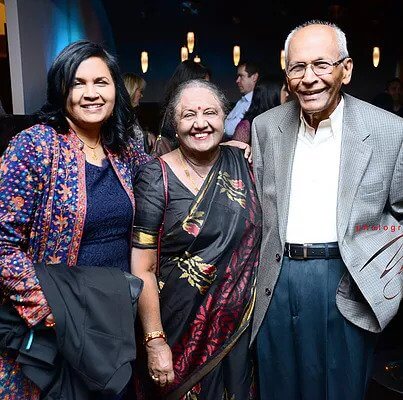
We don’t want to see medals or recognition. What we want to see is the happiness that this many children have and that they’ve had an education and then come back to visit. It’s like a home for them.
-vijaya ramakrishna
SARVA: So all my life, my parents would always talk about going back to India and doing something to help other people. They always had a heart for service. Even in the community that they lived in Charleston, West Virginia, there were always going out of the way to help the community and be part of the community. But, when they announced that they were going to go back to India and start this venture, we didn’t really realize the full impact of what they were doing. We just knew that they were doing something that they really strongly believed in. They really felt that they could make an impact and to see them take that leap of faith and go and take four acres of land that they owned and build something on it and then come back and give their friends and family a chance to help out..and then give us all a chance to be part of this impactful project has been life changing for us. It’s been an inspiration to see how much heart and soul they put into it. It’s taught us that every single person in this world has the opportunity to make a difference. Everybody can do something great with their life by helping other people. You know, it’s like the quote by Martin Luther King…you don’t have to have a degree to serve. You don’t need anything but a heart to serve. And that’s the biggest lesson that I’ve learned from my mom and dad.
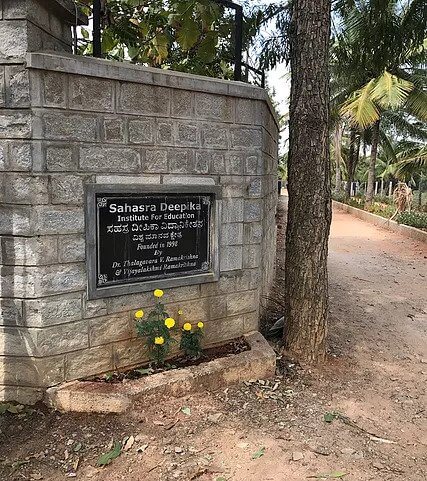
That is so beautiful.
VIJAYA: Yeah, it was tough…even our son didn’t even believe it. He said, “Mom, Dad keeps talking about it all the time.”
We were very definite about it. Dr Ramakrishna grew up in poverty. He knew how much the children need help and it was so bad in the 60’s when we went back, we couldn’t eat our food without thinking about the children here. Conditions were very bad. One meal was difficult for poor people at that time. Now it is much better, but we’re happy to see that it’s improving. Government is helping them to eat better and all that.
Myself and my husband knew we liked working with the children, but it was a very big responsibility. Girls specifically. Sometimes we divert our mind to think, okay, maybe battered women..they’re suffering and there is no senior place. There is no place for seniors to stay. Okay, we’ll try that one. So all this discussion went on for years and years. He lit the lamp. I started pouring the oil to keep it burning so nobody will forget this part that has to go on and on and on until I know that it is achieved. Ten children, I really want to give them food and give them a great education. Now, seven children have graduated today, 20 years later – they’ve graduated with degrees and many more are in the colleges now. This is the achievement of all who are a part of Sahasra Deepika. I thank God every day for his help in taking it so gracefully forward. Every child is divine to us. They are children. They have to grow up like children. Some of them have never seen their mother’s, some never seen fathers. It’s very emotional and God has brought us 20 years, which is really wonderful gem in our life. We are happy, so far, with what we have done.
We’re so happy that our daughter is a right hand for us and she’s there always. So we’re happy. We’re peaceful. They’re very happy. Every child calls in the middle of the night. I tell them, you have a freedom to call me anytime. So that’s what the freedom that we have given them. I feel that they’re very free and I feel some day they have to stand on their feet. Same thing I tell every mother, don’t put your child into the same position as you are. Make the child free and educated with us. Then you will have her daughter helping you. That’s what we do. So that’s what our model
A lot of people say, “I want to do something good. I want to change the world. I want to help somebody.” Your parents have not just helped one person, they’ve helped many, many people. They’ve sacrificed their life. Now you live a successful life in America. You really don’t need to be traveling to India, leaving everything for a week, two weeks, three weeks. Why is it so important for you to continue this legacy?
SARVA: What my mom and dad have done is create something so beautiful and so special that it’s so important to me to see it grow and continue and impact more lives, because there’s nothing that gives you more joy than seeing that you’ve made a difference in someone else’s life. There’s only so much joy that we can get from what we have. It’s what we can leave behind and knowing that we’ve impacted and, and left the world better than the way we found it is really the only way to live. To have that ultimate fulfillment in our lives. Life is such a gift. To see that you’re helping these girls at least realize some of the potential of that special gift that they have, to not have to just be on the streets like their parents or live alone or live suffering in the same difficulty.
At least you’re giving them a way out. You’re giving them a chance and then it’s up to them. I feel like doing that is the most wonderful thing that anyone can do. It gives me so much joy that when I’m at Sahasra Deepika, I completely forget everything. I don’t worry about anything because I just focus on the joy and the happiness and what I can do for those children. So I think when something moves you that much, that’s a voice inside you telling you that you’re in the right place. That’s what I found here. I didn’t know that I would necessarily follow along. I just wanted to help, but it became more and more a part of my life.
We’re lucky because you have really shown us the way. You educated us and you gave us a chance for a beautiful life and we’ve achieved that and now we have to give back and make sure that we continue, because you’ve built something that deserves to be continued to grow and help kids around the world. You have such a big heart, you know, you taught us about how to, how to love people the right way. It’s all about love really. It’s about the love that you have for, for your fellow human being. It’s about dad always saying, I know how poor children are ignored because he was ignored. It’s all about seeing people for who they are. And not for what money they make. So that’s what I’ve learned. That’s why it’s so important to me to continue whatever I can.
VIJAYA: Everything that I didn’t have I want to give them. I tell my girls, take up anything you want. Be good girls. Achieve it. I’ll be with you. Many times the times were like that – that first and foremost you had to get married, you can’t go to college…because you’re a girl. Now that’s what I’m trying to do. No matter what anybody says. No, no, no. If I send the child to the mother’s home, they’ll get them married so I don’t send them. I’ll put them in the hostels, give them education.
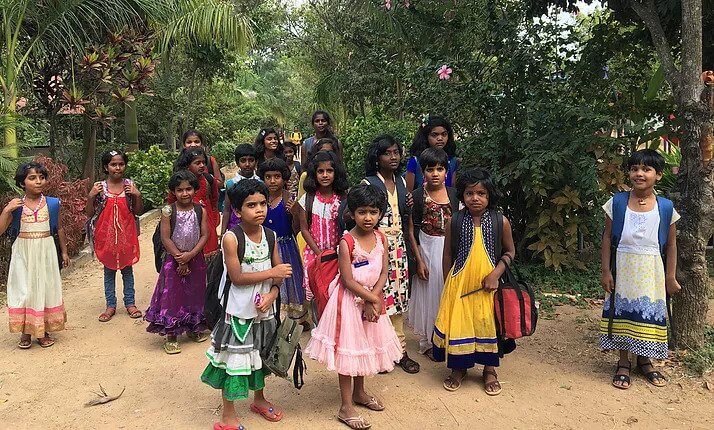
At some point, it’s going to be time for you to pass the torch. What do you hope to happen in the next 20 years at the helm of the school?
SARVA: I think over the next 20 years we just want to to see Sahasra Deepika get stronger. We want to see it serve more children. We want to see how we can engage in really great partnerships to help more children around the world, around India. We just want to show that education really is the most powerful thing that can help these children to lift out of poverty by encouraging our graduates to give back, by encouraging girls in the community at large to get involved with us. We want to be able to spread not only a message about education, but gender equality and how important it is to give girls and women a chance to stand on their own feet, to be the best that they can be – to give back of themselves to the world. Education really is the reason that we’re here.
If my father had not had a teacher who believed in him so much and encouraged him, he would never have been able to continue on and have a successful career as an engineer, come to the US and then see it come full circle – giving back and spreading fire of education through all of these other children and to think about spreading it to even more kids in the future I think is something that is very powerful. And that’s our dream really. It comes back to the meaning of Sahasra Deepika, which is a thousand lights. Hope, love and compassion for children in need. Each and every person could be a light for a child in need – and then if everyone was, we wouldn’t have that need anymore.
VIJAYA: Giving motherly love..I like to know each and every child’s feelings
SARVA: That’s the difference.
VIJAYA: That’s the reason we didn’t start another location because we wanted to keep it small – we want to see that every child is successful in her life.
SARVA: See that’s the special part of what Sahasra Deepika is. You and dad give so much love and attention to those children. That’s the challenge because we need to clone you and dad and a bottle you up so we can give that to everybody! We only have two of you.
Just like money makes a person happy at one stage, at another stage, giving love makes you happy! And that’s what happening to us.
-vijaya ramakrishna
VIJAYA: You get attached to that giving. Just like money makes a person happy at one stage, at another stage, giving love makes you happy! And that’s what happening to us. I’m very satisfied because more love we give, the more we want to keep giving. So we want to give them more and more and more to the needy children. When I see a child in the street, my heart goes there to see if I can get that child back to our place where we can make the child into a lotus flower. Giving love becomes infectious. Sometimes I forget my age, sometimes I forget my time limit. I keep thinking, my God, how can I get more children more children, and how can we do more things here? So this is a struggle I’m going through. Other than that, I’m very, very happy. How can we eradicate poverty? How can we bring more children and when everybody’s walking in the garden with their backpacks. I keep thinking, I wish we can get more chance to give all children this opportunity. That’s my wish.
